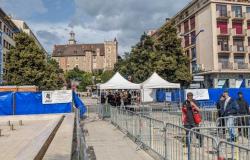Suffering from cancer, Mohammed al-Juneid’s wife must undergo radiotherapy. But in war-ravaged Sudan, the couple cannot afford to travel the hundreds of kilometers that separate them from the only hospital still providing this treatment.
“Even if we arrive in Meroe, in the north, we will have to wait our turn to receive this care,” laments Mr. Juneid, 65 years old.
In Sudan, a country fragmented since April 2023 by bloody fighting between rival generals, more than 70% of the health system is out of service, according to the UN. For tens of thousands of patients, finding care turns into dangerous odysseys across the front lines to reach saturated and under-equipped hospitals.
Many flock to Gedaref, a town in the east, and its oncology clinic, where several women wrapped in their traditional colorful veils, lying on their beds, share a large tiled room.
Ms. Juneid is undergoing chemotherapy there. Originally from central Sudan, she was undergoing radiotherapy at Wad Madani hospital. “It closed because of the war,” says her husband.
“Now the doctors have decided that she needs to undergo radiotherapy again, which is only available at Meroe hospital,” adds the overwhelmed sixty-year-old.
The driver, who agreed to take them there, covering 2,500 kilometers of bumpy roads dotted with checkpoints, demanded around $4,000. A small fortune that Mr. Juneid does not have.
Teacher, Fatheya Mohammed was receiving treatment at Wad Madani.
“The illness returned, I had to resume treatment,” she confides from her bed in Gedaref.
“Here there is no radiotherapy. It is available in Meroe, but it costs billions” of Sudanese pounds, she laments. “We don’t have the means.”
She has to carry out scans but it is also “very expensive”. And you would have to drive 200 kilometers to Kassala, even further east, near the border with Eritrea. Unrealizable: in one year, she received only three months of salary.
– Lives threatened –
Impacted by decades of conflict, health was already failing in Sudan, one of the poorest countries in the world. In a few months, the war delivered the final blow.
The two major oncology centres in Khartoum and Wad Madani have closed. Since then, the Gedaref hospital – with only 27 beds, when “at least 60” are needed – has been overwhelmed by the influx, admits its director, Motassem Morsi.
In 2023, “we welcomed around 900 new patients,” adds Doctor Morsi. The years before it was “between 300 or 400” patients, he remembers.
In the first quarter of 2024 alone, his hospital treated 366 patients.
Of the fifteen oncology centers in Sudan, a handful still welcome cancer patients. But only Meroe now provides radiotherapy, confirmed in October an article published by Sudanese doctors in the specialized journal “Ecancer medical science”.
However, “the costs associated with radiotherapy, transportation and accommodation make them inaccessible for many patients, forcing them to face imminent death without adequate care,” the authors point out.
“Limited access to oncology services during the current war endangers the lives of more than 40,000 Sudanese cancer patients,” the article warns.
– “Excruciating pain” –
And on a daily basis, there is no escape from physical pain.
Because the war disrupted “the supply chains and availability of opioid painkillers.” Patients then find themselves having to “endure excruciating pain”, specifies this same article.
At the end of May, the World Health Organization (WHO) sounded the alarm for the country of 48 million inhabitants, where nearly one in five people fled their homes because of the fighting.
“The health system is collapsing. Around 65% of Sudanese do not have access to care,” announced a spokesperson for the UN agency, Christian Lindmeier.
In “hard-to-reach” areas, only 20% to 30% of health facilities are still functional, “at a minimal level”.
In return, “considerable pressure” is falling on the few establishments still operational, “which risk being overwhelmed by the influx of people seeking care”, the WHO recently acknowledged.
This is what is happening in Meroe.
“We have two radiotherapy machines that work 24 hours a day,” says a doctor at the establishment, speaking anonymously.
“If one of the devices goes down for maintenance, it causes an overflow of patients, who come from all over Sudan.”
bur/tgg/sar/hme






